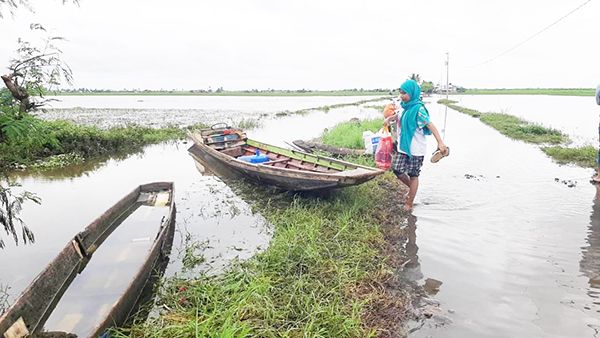FAO: Women in Bangsamoro region hit hard by climate change, conflict
DAVAO CITY – The prolonged crisis due to cycle of violence and impact of climate-induced flooding in the Bangsamoro Autonomous Region in Muslim Mindanao (BARMM) could deepen gender inequalities, an official of the Food and Agriculture Organization of the United Nations (FAO) said.

A FLOODED village in Maguindanao del Sur. (Contributed photo)
Dr. Lionel Dabbadie, FAO representative in the Philippines, said that the women's sector in the Bangsamoro region is bearing the brunt of the prolonged crisis brought about by climate change and conflict.
“Women, who already carry the dual roles of food providers and caregivers, are disproportionately affected. They are often the first to experience pangs of hunger, the physical toll of agricultural labor, and the psychological burden of displacement,” Dabbadie said.
A decade since the peace agreement between the government and the Moro Islamic Liberation Front have been signed, clashes have led to the displacement of thousands of people across the region.
Rido or clan war is often the root of infighting between MILF members and armed groups. In some cases, armed confrontations are between armed followers of local politicians.
The situation is sometimes aggravated by the perennial flooding in communities spawned by monsoon rains.
These flood-prone communities are also the same areas that were once devastated by decades of conflict. However, when the peace pact was signed, they continue to experience displacement due to impacts of climate change and conflict.
“Imagine being a child born into this reality. Imagine witnessing your mother and your entire family go through this. On top of all this, imagine having your education be at risk because of the conflict,” Dabbadie said.
Children in these communities, he added, face health risks due to poor sanitation, especially during floods. “With limited access to clean water, they become more vulnerable to water-borne diseases.”
Dabbadie said a woman from a partner-community bared that children in her community would miss school due to flood.
He said that children could not focus on their studies due to the flooding. “They grow up with the constant fear of losing everything again.”
Thus, to help address the adverse impacts of the prolonged crisis, Dabbadie said that they have been implementing Resilient Livelihood Development projects to assist select communities in the region.
Under the project, FAO has been teaching communities how to utilize raw materials locally available throughout the year, particularly those that can be stored for several months without losing their nutritional value as well as applying their local knowledge in food production.
Dabbadie said the project is being implemented in known conflict-affected areas such as Datu Odin Sinsuat and Talitay in Maguindanao del Norte and in Guindulungan, Datu Saudi Ampatuan, and Shariff Saydona Mustapha in Maguindanao del Sur.
These areas regularly experience severe flooding since they sit on the periphery of the Ligawasan Marsh.
Many of their community partners adopted vertical gardening as an alternative farming method, Dabbadie said. However, some of their crops still end up destroyed as floodwater rises rapidly, especially in low-lying towns.
“This is how we know that the project beneficiaries have extraordinary resilience: Their experience of conflict and disaster have equipped them with the foresight as well as the drive to bounce back after every crisis,” he said.
Amid these challenges, Dabbadie said that their community partners remain determined to protect what they have worked hard for, especially food production.
“These communities are now producing sought-after goods that enable them to earn a living and serve their communities. In fact, there has been higher demand for their goods that they are also compelled to produce more.”
The project has been expanded to the Indigenous Peoples communities of Teduray in South Upi town in Maguindanao del Sur.
The BARMM-Rapid Emergency Action on Disaster Incidence (Bangsamoro READi) reported that the recent flooding due to the trough of severe tropical storm “Kristine” has affected about 36, 000 families from both Maguindanao provinces.
As of Oct. 23, Bangsamoro READi reported that flooding also affected at least 145 hectares of agricultural land with an estimated loss of almost P2 million.